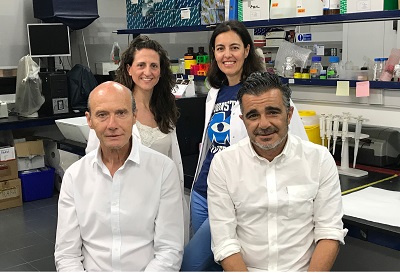A research group of the department of Parasitology in collaboration with the Central Service for Experimental Research of the Universitat de València has claimed that the protein of the immune system IL-25 makes possible the resistance to the helminths or intestinal worms that are present today in more than a billion people. The study, published in the journals 'Scientific Reports' and 'Trends in Parasitology', reveals that if the digestive tissue is not restored, then the infection could be chronic.

The intestinal helminths have a significant impact on the human health. The child population is the most afflicted by these worms, in particular in developing countries. Furthermore, the incidence and seriousness of this infection has sharply increased at an international level in recent years. The intestinal helminths also cause major losses in the ranching due to the expensive treatment costs. The infection causes in humans diarrhoea, vomit and other digestive problems, anaemia, growth and cognitive impairment, among others.
“The IL-25 is the protein that triggers a resistance to the intestinal helminths. Therefore, its absence or presence will be decisive in the seriousness of the illness”, explains Rafael Toledo, professor of the department of Pharmacy, Pharmaceutical Technology and Parasitology of the Universitat de València and member of the RICET group. The experts explains that these parasites are able to stop the creation of the IL-25 protein, so people are more vulnerable to this disease and it is more likely to become chronic.
The research of the group of Immunoparasitology, headed by Rafael Toledo, has revealed that the pharmacological treatment of the infection which involves a regeneration of the intestinal tissue, needs more IL-25 protein that stems from the intestinal cells and makes our organism more resistant to the worm.
The interleukins are a group of proteins of the immune system that have a communicative fucntion among molecules in order to turn the defense system against pathogens into a more rapid and efficient one. There are two types of immune reactions: a susceptibility response to the disease (type th1) and a resistance response to it (type th2).
The experiment has been carried out with the intestinal parasite Echinostoma caproni, which is extremely used as an experimental model to investigate the factors that determine the resistance to the intestinal helminths and the development of chronic infections. This was removed from the kidney and the pericardic cavity of snails and was injected in three groups of mice (infected, treated and reinfected). In the first group there was no drug, but in the other two, the treatment was praziquantel (pzq). The regeneration of the intestinal tissue after the treatment made possible that the mice of the last group were resistant to the reinfection in a process via IL-25.
Research group
The research group in Immunoparasitology belongs to the department of Pharmacy, Pharmacological Technology and Parasitology and RICET and is composed entirely by professors of the master’s degree in Tropical Parasitic Diseases. The main research line of this group is the immune response to intestinal parasites and its consequences.
The work, which has been recently published, has the support of the Ministry of Economy and Competitiveness, the PROMETEO programme of the Educational Region Department, RICET, the 4th National Programme of R+D, the General Subdirector of Cooperative Research Centres and Networks and FDER funds.
Articles:
- Alba Cortés, Carla Muñoz-Antoli, J. Guillermo Esteban, Rafael Toledo: «Th2 and Th1 Responses: Clear and Hidden Sides of Immunity Against Intestinal Helminths» Trends in Parasitology 1643. Available online 26 maig 2017. DOI: http://dx.doi.org/10.1016/j.pt.2017.05.004
- Carla Muñoz-Antoli, Alba Cortés, Rebeca Santano, Javier Sotillo, J. Guillermo Esteban i Rafael Toledo: «Interleukin-25 Induces Resistance Against Intestinal Trematodes» Scientific Reports 6: 34142. DOI: http://dx.doi.org/10.1038/srep34142

.jpg)







